Martin Edwards's Blog, page 84
November 4, 2020
Bonfire Night and Murder
Quite a few crime novels have been set, in part at least, on or around Bonfire Night. This is hardly surprising, given that (except during a pandemic and a lockdown!) it's a time of vivid colours in the night sky, with the potential for crime in the hours of darkness. Several authors have had the idea of a Guy Fawkes on a bonfire turning out to be a murder victim. I doubt they have copied each other - it's just one of those concepts (and there are loads of them) that are quite likely to spring to mind when one is thinking up scenarios for a murder mystery.
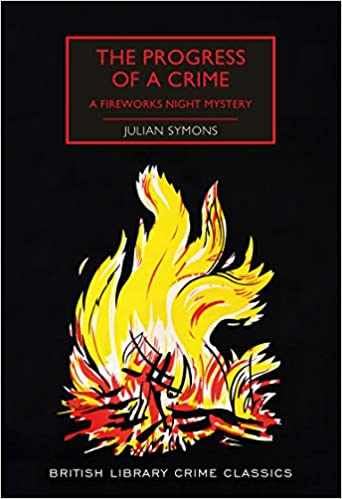
Julian Symons' The Progress of a Crime, which is the subject of a timely reissue in the British Library Crime Classics series, is proclaimed on the suitably vivid cover as a Fireworks Night mystery, and that's when the eponymous crime occurs. The case is investigated by a young journalist, and Symons actually worked in a provincial newspaper office as part of his research. The crime in question was based, as I explain in my intro to the book, on a real life case which many people think gave rise to a miscarriage of justice - a subject that was of great interest to Symons at that stage of his career.
The book won the Edgar for best novel, and came close to winning a Gold Dagger for good measure. At this point Symons' career as a novelist was really at its peak in terms of acclaim and awards, but he continued to write extremely interesting fiction until the end of his life. The Colour of Murder, which did win a Gold Dagger, and The Belting Inheritance, one of his less well-known novels, have previously been reprinted in the Crime Classics series.
The Progress of a Crime has particular significance for me since it was the first Symons novel that I read, at the age of thirteen or so. It was also, as far as I can recall, the first time I'd graduated to contemporary crime writing after cutting my teeth on Christie, Sayers, and company. An old paperback copy was on the shelves in the house of some family friends and I picked it up and started reading it when I got bored with the adults' conversation. I was intrigued, and soon became a big Symons fan - after reading The Man Who Killed Himself. It's terrific to see him back in print again.
November 2, 2020
The Sister - ITV review
In the run-up to Halloween, I read and watched a number of ghost stories and other strange tales in fiction, film and TV. Everyday life at present seems weirder than fiction, but I must admit that I prefer strangeness in storytelling rather than in a world of masked passers-by and mysterious viruses. Stories are, at the very least, a wonderful escape. There was one particular film which I thought outstanding, but today I'm going to talk about The Sister, the fourth and final part of which aired on ITV the other day.
The story, told in part through multiple flashbacks, was adapted by Neil Cross from his own novel Burial, which I haven't read. Russell Tovey plays Nathan, who is married to Holly (Amrita Acharia). They are successful and live in a posh, if soulless house, and are trying for a baby without much luck so far. Nathan is, however, disturbed when a strange man, Bob Morrow (Bertie Carvel, in manic mode) turns up to tell him that a local woodland is being dug up to make room for new housing. Nathan panics, and no wonder.
To cut a long story short, it soon emerges that Nathan and Bob buried in the woodland the body of a young woman. This was Elise (Simone Ashley) and, although we don't at first know the circumstances of her death, we learn that she is Holly's sister. Obsessed by what had happened, Nathan sought out Holly and then fell in love with her. There are several creepy and unlikely elements to the story, but for me the one that really didn't work was Nathan's marriage to the dead girl's sister. Unfortunately, that's a cornerstone of the whole edifice.
Cross is a good TV writer, and The Sister has had one or two favourable reviews, but after an engrossing start, I thought it went downhill. Several aspects of the plot development seemed all too predictable, and I didn't really buy in to Tovey's portrayal of Nathan, which may be a criticism of the material rather than the actor. As so often with contemporary TV series, it could have done with ruthless cutting. There was, however, some compensation in the final twist.
October 30, 2020
Forgotten Book - The Flanders Panel
The book begins with Julia's discovery of a Latin inscription hidden beneath a painting that she has been tasked with restoring prior to its sale. The painting depicts two knights playing a game of chess, watched by a woman. The inscription, translated, is :'who killed the knight?' Perhaps in the context of chess it could be interpreted as 'who captured the knight?' But Julia begins to wonder if the inscription is a clue to a crime of the past.
She confides in her mentor, an older gay man called Cesar, who represents a father figure. Her former lover also becomes involved, but is then found dead. Has he been murdered, and if so, by whom, and why? Do the elderly owner of the painting and his unlovely family members have something to hide? And what about another of Julia's friends, the glamorous but dissolute Menchu, who is also involved in the machinations to market the painting?
The story begins with a quote from a Jorge Luis Borges poem about chess, and the text includes numerous examinations of stages in the chess game in the painting, as a chess expert calls Munoz helps Julia to figure out what is going on. I like chess, but I think that even someone who doesn't play the game would find this story readable and pleasingly different. Recommended.
October 28, 2020
The Lighthouse - 2019 film review
The Lighthouse is a recent horror film, made in black and white by Robert Eggers, who also co-wrote the screenplay with his brother. Apparently the original spark for the story came from Edgar Allan Poe's final, unfinished story with the same title, but otherwise there is no resemblance between the two works. This is an unsettling film, full of ambiguities. Explanations for what's going on are in short supply, but although in some movies that matters a great deal, here it does not. To me, the ambiguous nature of the storyline is a plus. So is the setting - lighthouses and small islands have fascinated me since I was young, and the combination is irresistible.
The set-up is simple enough. It's the late nineteenth century, and a young man, Ephraim Winslow, arrives at a lighthouse on a remote, fog-blanketed island for a four-week stint as a 'wickie', assisting the veteran lighthouse keeper Thomas Wake. The two men are played respectively by Robert Pattinson and Willem Dafoe and both give superb performances.
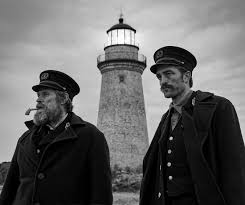
We soon learn that Ephraim's predecessor went mad, and we aren't in any doubt that Bad Stuff is destined to happen. I don't want to say too much about the detail of the storyline, but suffice to say that the lighthouse lamp, a mermaid, and a one-eyed gull all play key parts in the events that unfold. There's a hallucinatory quality to much of the filming, and the desolate, lonely location is marvellously atmospheric.
With a horror story of this kind, a writer may opt to give the satisfaction of an explanation of events, or leave things murky. Either method can work; everything depends on the skill with which the story is told. Much as I love rational detective stories with ingenious solutions, I'm also keen on strange, inexplicable stories such as those written by the great Robert Aickmann. The Lighthouse isn't exactly an Aickmann-type of story, but its strangeness is a large part of its appeal. I found it compelling.
October 26, 2020
British Library Crime Classics in 2021
The British Library recently announced their programme of Crime Classics for the first half of 2021 and I've already talked about my delight regarding the first-ever publication of E.C.R. Lorac's Two-Way Murder, which I think is a real coup for the imprint. I'm also pleased about the diversity, to use a topical word, of the forthcoming titles. They really are a mixed bunch. Some will appeal to certain readers more than others, but that's fine. I do think that the eclectic nature of this series is a big part of the reason for its continuing success. 'Classic crime' is much more than gentle whodunits set in English villages of the 30s, not that there's anything wrong with them - as I've mentioned in the past, The Murder at the Vicarage was my introduction to mystery fiction.
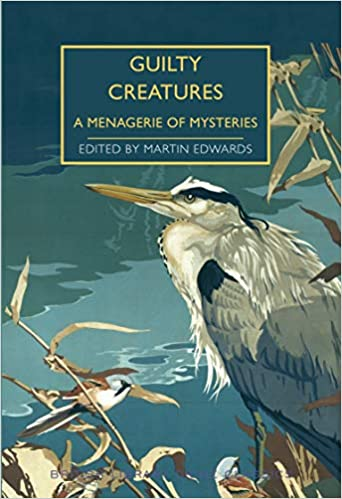
There's an anthology coming up. Guilty Creatures ('a Menagerie of Mysteries'!!) is a collection of stories connected with the animal world in one way or another. I'll talk more about the contents another time. Suffice to say that I'm pleased with the title. When I wrote the book that became Take My Breath Away, I intended to call it Guilty Creatures. But another novel with that title (not a crime story) came out ahead of mine, and my agent asked me to change the title. At last I've finally used it...
There's another John Dickson Carr, The Corpse at the Waxworks (we're using the US title) and another Mary Kelly. Don't be fooled by the cheery, summery cover of Due to a Death - it's a pretty bleak story, albeit very well-written and much praised by the top American critic, Anthony Boucher.
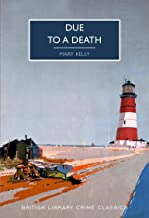
For light relief, I can recommend Nap Lombard's Murder's a Swine, an amusing war-time mystery. And then there is The Chianti Flask by Marie Belloc Lowndes. She remains known for The Lodger, but her other work in the genre is under-rated. Real life crime intrigued her, and as a result her fiction studies attitudes towards crime in a way that, decorous as the prose may be, seems to me to be rather ahead of its time.
October 23, 2020
Forgotten Book - No Coffin for the Corpse
Rawson's career as a novelist was brief, although he continued to write short stories with a locked room or impossible crime focus. In addition to Merlini, he created Don Diavolo (great name!), who makes a fleeting appearance in this book, although generally the Diavolo stories were published under the name Stuart Towne. No Coffin for the Corpse failed to find a UK publisher and did not appear in this country until Tom Stacey brought it out in 1972, the year after Rawson's death.
It may be that Rawson became disappointed and frustrated as a novelist (it happens!), or it may be that he struggled to find story ideas that would sustain a full-length novel. It may be relevant that this story begins quite brilliantly but does not, in its later stages, quite fulfill its early promise. I do think it is a real challenge to write a high-calibre impossible crime novel - the locked room is a trope that, I feel, tends to suit the short story form better (and yes, I know there are quite a number of excellent exceptions, not only by Carr but by others).
Here, Harte is frustrated when the rich but odious Dudley Wolff determines to nip his daughter's romance with Harte in the bud. Wolff has a fear of death which again is eminently suited to this kind of macabre mystery, and when he becomes embroiled in an attack on a blackmailer, he persuades others to help him to bury the blackmailer's body in the woods. But then the corpse appears to take on a life of its own...
A great premise, but the amount of space devoted to justifying the legitimacy of the explanation for the mystery seems rather like protesting too much. I suspect Rawson realised that the trick he used would frustrate some readers. However, he does a good job in terms of coming up with - and juggling - multiple solutions to the key murder in the story. Overall, even though this book is not his best, it's good light entertainment.
The Diamond Dagger
The first thing to say about last night's CWA Dagger awards was how slickly and efficiently the whole event was organised. It was really impressive. I know how stressful it can be to organise the evening even in normal times and when you're reliant on technology, there's an added level of uncertainty. But it all went without a hitch. Many congratulations to Chair Linda Stratmann, Secretary Dea Parkin, M.C. Barry Forshaw and techno-wizard Antony Johnston as well as the rest of the team. They did everyone proud.
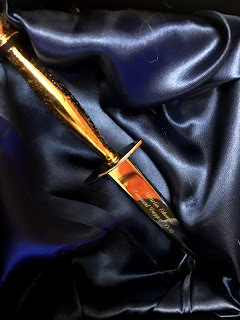
There's no doubt that to receive the Diamond Dagger is the greatest moment of my career as a writer (and it beats anything in my career as a lawyer, come to that). I was grateful that Ann Cleeves kindly agreed to present the Dagger virtually - when we recorded the presentation she made the point that there was a 'satisfying symmetry' about it, given that I presented her with the Diamond Dagger three years ago. The photo at the end of this post shows us with the actual Diamond Dagger, which is kept in a safe for most of the year, because it really is heavy with diamonds. Maybe I'll be allowed to touch it again at some future date!
As I said, there are particular reasons why this award is very special to me. First, when one looks at the list of previous recipients. It's a stellar group - P.D. James, John Le Carre, Ruth Rendell, Elmore Leonard, Ed McBain, Sara Paretsky, Michael Connolly, Reginald Hill, Ian Rankin, Val McDermid, Lee Child, Andrew Taylor, Ellis Peters, Eric Ambler - the list goes on. To join that exalted company is extraordinary.
And then there's the fact that the award is voted by one's fellow writers. Nominations come in from CWA members. They are then whittled down to a shortlist by a sub-committtee, and finally the CWA board votes on the shortlist. So quite an elaborate process. And perhaps I can share one anecdote about it from the late 90s.
At that time, I was phoned up by Reg Hill. He'd recently been awarded the Diamond Dagger and was on the CWA board. He'd been asked to form the shortlisting sub-committee, to ensure that standards were kept high. He said to me that he didn't really care for being on committees, but he'd like me to collaborate with him on choosing shortlists of suitable recipients. He said that, having received the award himself, he wanted to make sure that future recipients were of the right calibre and he explained in a very clear way what that meant. He felt talking it all through with me would work well and be fun for both of us. And he added that it was obviously too soon for me to be a candidate myself, but that one day, although not for a fair few years, he felt my time for the Diamond Dagger would come.
It was an invitation I couldn't refuse, and he was right - our conversations over the years were a lot of fun. Because he wasn't the sort of man who ever indulged in glib flattery, I was hugely touched by the fact he thought my writing was potentially good enough to qualify me one day for the Diamond Dagger, though I found it almost impossible to imagine that I'd be so lucky. And now it's actually happened. I like to think that Reg, who gave me a lot of encouragement over the years, would be pleased. And I'm truly happy to receive an accolade that once seemed so distant and improbable.
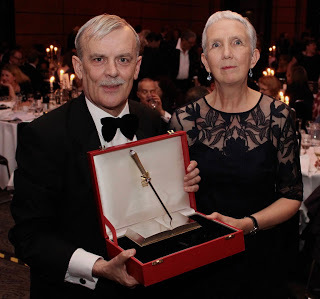
October 20, 2020
Jill Paton Walsh R.I.P.
I was so sorry to learn yesterday of the death of Jill Paton Walsh. Jill was an accomplished author in several fields and her Knowledge of Angels was famously shortlisted for the Booker Prize having originally been self-published. Detective fiction fans appreciated her short series of novels set in Cambridge and featuring Imogen Quy, and she made a real splash when she completed Dorothy L. Sayers' Thrones, Dominations. Not content with that, she proceeded to publish three more books featuring Lord Peter Wimsey.
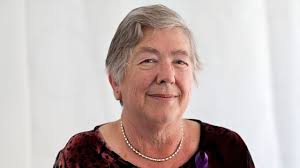
I first met Jill (and her late husband John Rowe Townsend) some years ago at the St Hilda's mystery conference. I'd previously enjoyed both an Imogen Quy and Thrones, Dominations. There are, of course, widely divergent views about 'completion' and 'continuation' novels featuring favourite detective characters. The test for me is simply this: how well is it done? Suffice to say that Thrones, Dominations is the book of this type that I admire more than any other. To follow in Sayers' footsteps is particularly daunting, but Jill turned a fragmentary manuscript into a coherent whole with great style.
Jill was a member of the Detection Club, though I hadn't seen her for some time at the point when I was working on Howdunit last year. A mutual friend told me that she was rather frail, and at first my instinct was not to trouble her for a contribution. However, I decided to drop her a line rather than send an email, and received a cheerful and extremely positive reply. She told me it was the first handwritten letter she'd received all year...
Various enjoyable telephone discussions followed (the editorial process with Howdunit was fascinating and certainly unique in my personal experience). The upshot was that Jill contributed a lovely piece, developing points she'd made in an article some years ago, called 'One Thing Leads to Another'. It was very much in the inspirational spirit of Howdunit and presumably it was her last published piece of work. It's sad that we've lost her, but her literary legacy is impressive and will endure. On a personal note, I cherish the memory of those conversations.
October 19, 2020
Changed Times
One of my techniques for getting through the pandemic has been to avoid thinking of what I might have been enjoying had everything gone to plan. It's far better to be positive wherever possible. I must admit, however, that over the weekend inevitably I was thinking about Bouchercon in Sacramento, a trip I was very much looking forward to. As I write these words, I should be on a flight back to England, and looking forward to the Daggers Dinner on Thursday, complete with presentation of the Diamond Dagger, the highlight of my career.
Oh well, things haven't turned out quite as hoped or expected, but that's the same for everyone. And a lot of people have been doing good work to give us crime writers and readers opportunities to get together, even if in a restricted way. The Bouchercon organisers set up a virtual event, for which I pre-recorded my interview with Anthony Horowitz. I also took part in a live panel (thank goodness I worked out the correct time zone and didn't miss it!), talking about cold cases with an old friend, Marcia Talley as well as a number of American writers who shared some fascinating insights.
I was also delighted to see several friends' names among the Anthony winners, including Hank Philippi Ryan, Verena Rose and Shawn Reilly Simmons, Gigi Pandian, and Art Taylor's wife Tara Laskowski. Congratulations to all of them, and also to the hard-working people who made it all possible. I just wish I could have bought them all a drink - but there'll be time for that in the future, with any luck.
Similarly, thanks go to Matthew Booth, who organised a virtual meeting of the CWA northern chapter on Saturday. So good to see people, albeit remotely. It's not the same as a proper get-together in person, of course, but it's much better to stay in contact in whatever way we can. The pandemic has really underlined the importance of our social lives - and how vital it is to enjoy every opportunity of being with our friends and family.
The CWA folk have also been busy organising a virtual version of the Daggers awards. Whilst I won't be able to get my hands on the actual Diamond Dagger (which is brought out once a year for the ceremony) I have received my personal award and I've recorded two videos for the occasion. Ann Cleeves kindly agreed to the CWA's request to 'present' the Diamond Dagger to me, and in addition to the video, we also recorded a conversation, reflecting on our personal journeys as writers. You can bet that I'll be quaffing champagne on the night, even if in my own living room rather than in a glitzy hotel in London. And it will be a good opportunity to reflect, not on the frustrations of pandemic life, but on all those good things which far outweigh the negatives.
October 16, 2020
Forgotten Book - Deadly Hall
Delys Hall has earned the nickname Deadly Hall: some years ago, a man died there in mysterious circumstances. Now Dave is perplexed by the will of his late grandfather, who has bequeathed the Hall to Dave and his sister Serena. It seems that the Hall contains a great deal of gold, but the treasure is well hidden...
There is a good story lurking in Deadly Hall. The treasure sub-plot is, I feel, really neither here nor there, but the method by which a murder is committed on the premises, and the motive and identity of the perpetrator are interesting and satisfactory. The main difficulty is that it's quite a slog to get to "the good bits" of the story. The narrative is, to put it kindly, discursive. Pace is often lacking as the narrative gets bogged down time and again.
Carr was not a well man at the time he wrote this book, and it certainly doesn't compare with his best novels. There were, I must confess, moments when I thought that Deadly Dull might have been a better title. However, developments later in the story did engage my interest. If you haven't read Carr before, I certainly wouldn't start here. And if you're a fervent fan, you need to manage your expectations of this one. Overall, however, I was glad I battled through to the final revelations.



